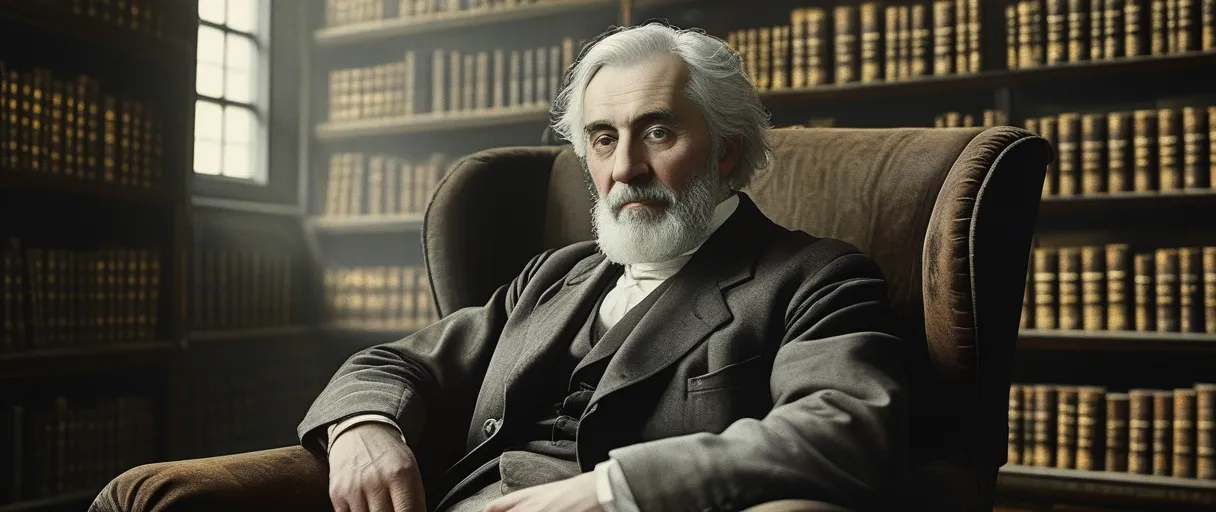
Ivan Sergeyevich Turgenev
Ivan Sergeyevich Turgenev was an influential Russian novelist known for his profound exploration of human nature, moral introspection, and social critique within Tsarist society.
Full Name: Ivan Sergeyevich Turgenev
Died: Dieppe, Dieppe, France on September 3rd, 1883
Lived: Paris, Paris, France
Notable Works
Ivan Sergeyevich Turgenev is celebrated for his insightful exploration of human emotion and social dynamics, most notably in his timeless novella "First Love." This poignant coming-of-age story delicately captures the complexities of youthful passion, weaving themes of innocence, heartbreak, and the bittersweet transition from adolescence to adulthood. Turgenev's nuanced portrayal of love and formative experience has resonated deeply with generations of readers, securing his place as a master of psychological depth and literary subtlety.
Beyond "First Love," Turgenev's literary legacy is profoundly shaped by his acclaimed novel "Fathers and Sons," a pivotal work within Russian realism. It thoughtfully examines the generational divide and philosophical tensions in 19th-century Russian society, particularly through the memorable character of Bazarov, a charismatic nihilist whose ideals sharply contrast with those of an older generation. Turgenev’s compelling narrative and compassionate insights into human nature have ensured his enduring reputation as one of literature’s most perceptive observers of social change, generational conflict, and heartfelt emotional landscapes.
Books by Ivan Sergeyevich Turgenev
Overview & Analysis
Ivan Sergeyevich Turgenev was a distinguished figure in Russian literature, born into aristocracy and deeply engaged in the philosophical exploration of human nature and society. His writings are renowned for their subtle yet incisive critique of the strict social hierarchies and conventions of Tsarist Russia. Turgenev's literary approach is characterized by profound emotional honesty and a steadfast commitment to individual moral introspection, often depicted through characters who undergo significant internal transformations. His celebrated work, "First Love," exemplifies his nuanced portrayal of emotional complexity and youthful passion, serving as a reflection on the universal human experiences of love and disillusionment. Through his thoughtful examination of internal moral evolution, Turgenev not only offered social commentary on the constraints and expectations of his time but also advocated for personal integrity and authenticity amidst societal pressures. His legacy persists in literature as an eloquent voice for ethical introspection, emotional sincerity, and the quiet yet powerful resistance to conformity.
Back to TopInfluences & Worldview
Ivan Sergeyevich Turgenev, born into Russian aristocracy, was a profound philosophical thinker whose work consistently explored the intricacies of human nature and internal moral evolution. Living under the restrictive Tsarist autocracy, Turgenev developed a critical perspective on rigid social hierarchies and class structures. His narratives often offered insightful social commentary, subtly challenging established norms and conventions. Rather than advocating for outright rebellion, he emphasized personal integrity, emotional honesty, and individual moral judgment over blind social conformity. Turgenev's characters frequently embark on transformative inner journeys, symbolizing deeper philosophical truths about life and society. His pacifist leanings, coupled with a nuanced critique of traditional morality and capitalist ethics, reveal a compassionate worldview deeply invested in ethical introspection and societal reform. Ultimately, Turgenev's legacy is marked by his sincere exploration of humanity's internal conflicts and his advocacy for personal authenticity amidst societal constraints.
Relevant Historical Events
- Rise of Russian Romanticism (1820 – 1840): Russian Romanticism emphasized emotion, individual perception, and nature—elements that heavily influenced early 19th-century Russian prose. Writers explored introspection and personal transformation, themes central to books like Tolstoy’s Boyhood.
- Rise of Russian Intelligentsia (1830 – 1860): Emergence of a new educated social class focused on intellectual reform, critical of traditional authority and serfdom, advocating for political and social modernization.
- Emancipation of Serfs (1861): Declared in 1861 by Tsar Alexander II, this reform freed more than 23 million Russian serfs, marking a pivotal moment in Russian social history. While it ended legal bondage, it left many peasants economically dependent and sparked decades of political unrest and reflection.
Notable Characters
Ivan Sergeyevich Turgenev is acclaimed for crafting deeply introspective, emotionally nuanced characters who vividly embody the tensions and transformations of 19th-century Russian society. Notable among these is Vladimir Petrovich, the protagonist of "First Love," whose youthful innocence and intense passion illustrate the bittersweet awakening to life's complexities and disappointments. Similarly, characters like Yevgeny Bazarov from "Fathers and Sons" epitomize the generational conflict and ideological struggles that marked Turgenev's era. Bazarov's stark rationalism and nihilistic worldview sharply contrast with traditional values, highlighting societal shifts and the personal turmoil accompanying them. Turgenev's characters frequently grapple with emotional authenticity, social expectations, and existential uncertainty; their inner conflicts and profound introspection reflect the author's keen psychological insight. By portraying individuals caught between tradition and modernity, idealism and disillusionment, Turgenev's nuanced characters offer a compelling exploration of human vulnerability and resilience, illuminating the broader historical and cultural forces shaping their lives.
Back to TopThemes of Focus
Ivan Sergeyevich Turgenev consistently explores themes of romantic idealism, societal transition, and generational conflict. His work frequently portrays delicate emotions and the complexities of youthful love, illuminating the internal struggles individuals face when confronting passionate idealism against harsh social realities. Additionally, Turgenev highlights the evolving dynamics of Russian society in the 19th century, notably the tension between tradition and progressive liberalism, often manifested through conflicts between older conservative generations and younger radicals.
Secondary themes such as the influence of familial authority and the subtle undercurrents of class disparity frequently reinforce these primary ideas. By carefully weaving personal narratives into broader societal shifts, Turgenev examines how individual aspirations and desires are shaped, constrained, or liberated by their historical and cultural contexts. Reflecting his own liberal worldview, Turgenev's nuanced exploration of these themes provides insight into Russia's complex socio-political climate during a period marked by reform and ideological debate.
Back to TopLegacy & Impact
Ivan Sergeyevich Turgenev profoundly influenced literature and social thought through his incisive exploration of human psychology, moral introspection, and societal critique. His nuanced portrayal of personal struggles against oppressive social norms and rigid class structures resonated across Russia and beyond, significantly shaping literary realism. Turgenev's acute social commentary and philosophical depth inspired contemporaries and later authors alike, notably impacting literary giants such as Henry James and Joseph Conrad.
His literary legacy endures today, particularly through the continued relevance of characters and themes that grapple with individual morality versus societal expectations. Works like "Fathers and Sons," notable for introducing the concept of nihilism, remain widely studied in schools and universities, reflecting ongoing discussions surrounding generational divides, social reform, and personal authenticity. Modern scholarship frequently revisits Turgenev's depictions of emotional sincerity and ethical introspection, finding fresh resonance within contemporary debates on identity and social conformity.
Although his relatively moderate political stance drew criticism from some radical contemporaries, today his balanced perspectives are appreciated precisely for their enduring relevance, complexity, and humanistic empathy. Turgenev's works continue to be adapted into various media, affirming his lasting influence on literary culture and social discourse.
Back to TopConclusion
Ivan Sergeyevich Turgenev's work retains enduring relevance, resonating deeply with modern readers navigating complex societal and personal landscapes. His thoughtful exploration of internal moral evolution and individual authenticity within restrictive societal contexts continues to offer valuable insights into contemporary struggles between personal identity and social expectations.
Turgenev's philosophical depth and nuanced social commentary significantly shaped literary traditions, influencing generations of writers to candidly examine human nature and societal structures. His emphasis on emotional honesty and moral introspection invites readers to reflect on their own experiences and choices.
Today, exploring Turgenev’s stories remains a rewarding endeavor, providing profound perspectives on integrity, compassion, and the courage required to resist conformity. His gentle yet incisive critiques inspire thoughtful engagement, encouraging readers to embrace personal authenticity and ethical reflection in an ever-changing world.
Back to Top